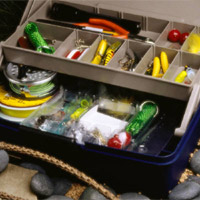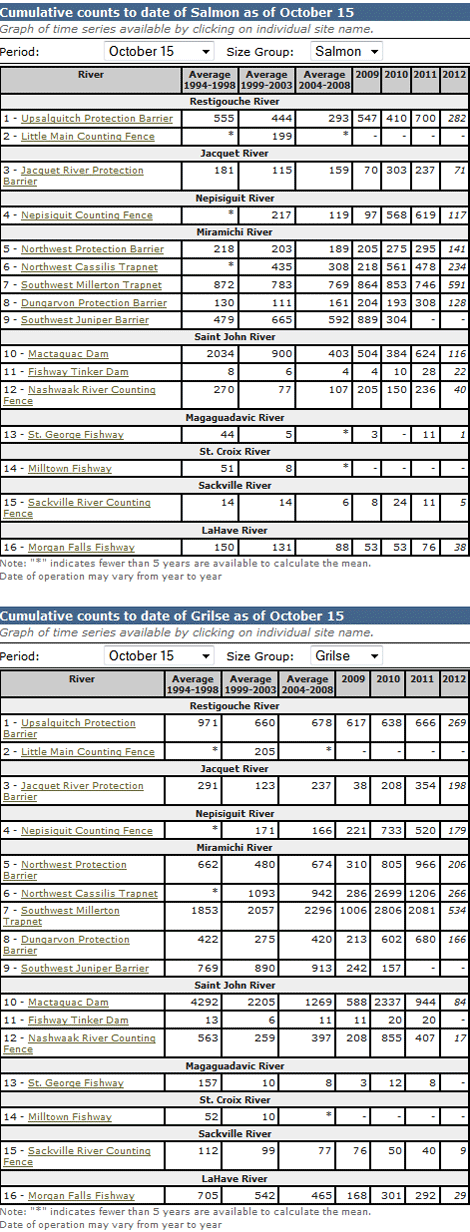With only the Bartibog, Burnt Church and Tabusintac Rivers open for four more days, there has not been a lot of angling activity.
When angling is over for another year, most anglers simply chuck their equipment out in the garage or in the basement where it remains until next season. Wise anglers will take a few minutes to examine their equipment and properly prepare it for winter storage. This ensures a better start next year because the gear will be in top shape for another season.
 First look at your waders unless you still plan to use them for some duck hunting. When you have finished with them, they should be thoroughly dried and stored in a cool dry place. Avoid the furnace room as high heat may cause cracks, producing an unpleasant surprise next spring.
First look at your waders unless you still plan to use them for some duck hunting. When you have finished with them, they should be thoroughly dried and stored in a cool dry place. Avoid the furnace room as high heat may cause cracks, producing an unpleasant surprise next spring.
George Routledge of George’s Fly Shop in Renous suggests hanging them up side down, or if they are hung by the braces, that they barely touch the floor with no wrinkles in them. Putting some newspaper in the boot part will prevent moisture and mould from setting in. If the waders are the type without a boot, make sure they’re rolled rather than folded as creases will crack.
Next, the rod definitely should be taken apart if still together, or it may never come apart. Dry and wipe it down, removing dirt and dampness. Make sure the cork is dry, and then store it in a place with moderate temperature, and out of the way until spring. This ensures it doesn’t get other stuff piled on it resulting in breakage. A bit of parawax on the male end will make it fit better next year. This is a good practice several times throughout the season even. Check guides to see if they need repair or that there is no fraying of the binding. If a touch up is needed, now is the time to get it done to be ready for opening day.
The line and backing should be reeled off, stretched, cleaned and dried. Then it can be coiled loosely and stored for next season.
To clean, use plain water or silicone to grease-clean it. Cortland puts out small pads which sell for about a dollar or two. These can do several lines. This helps against cracking. If the backing is over three years old, replace it. This might save losing a nice bright grilse or salmon (not to mention the line itself) next season.
Routledge suggested taking the reel completely apart, letting it dry and cleaning all dirt from it. Then it should be given a covering of light oil that is heat resistant. He suggested, Singer sewing machine oil or a light gun oil. He cautioned against using WD-40 as it is a penetrating substance.
Next, empty the fly-boxes so flies and boxes can dry thoroughly. This will stop rusting and ruining the hooks as well as the metal boxes. Make sure the box is clean. Then organize the flies as you put them back with the spring streamers in one area or box, the larger flies for June and early July in another, the summer flies and smaller hooks for late July and August together and then the fall patterns. One might even put the open box in a Tupperware container with a couple of moth balls to make sure nothing eats the hair and feathers. Make sure everything is completely dry before sealing. Don’t forget the flies still on the vest or hat, or where ever you keep them while on the river.
The vest should also be dry, pockets emptied of debris and minuscule lunches, bottle tops, old fly dope containers and any other garbage. It may even be washed or dry-cleaned. Then replace all equipment making sure covers are tight on such bottles as gink or xink, dry fly sprays, fly dope, or scent etc. These can destroy a perfectly good vest. Don’t forget to put the polarized sun glasses and glasses-holders back in the vest so you have them next season.
Routledge suggested throwing away any leader that is no. 6 or 8 as it may rot. Losing a bright grilse next June is not worth the cost of a new roll. He said no. 10 and up, could be kept providing it is not too old.
Even the landing net should be dry and stored.
If you own a boat/trailer that needs touching up or slight repairing, do it now rather than scramble come next spring.
If all of these simple things are done, it will put you in fine shape when the fever hits again next spring.
While out, take a trip to the upper stretches of your favourite stream. You make be lucky enough to see the salmon actually spawning.
Watch as the hen salmon uses her tail to dig her redd (a small bed in the gravel where she will deposit her eggs). Then watch as she hovers over it, dropping eggs. You will probably see another dorsal fin zoom in next to her, as the male fertilizes the eggs by releasing his milt. It is nature’s miracle, and the future of the sport we love. And it is a great excuse to get even another trip “on the water.”
Now that angling is actually over, join a salmon conservation group such as the MSA, or fly-tyers group in your area, and get involved over the winter. Most areas will have their own special clubs and organizations. When you hit the water next spring, you’ll feel more a part of the whole process, and it’s a good way to further interest in the sport we love.
The Atlantic Salmon Federation located in St. Andrews, NB., have four good salmon journals a year which is good reading during the winter months. Check your local organization first as there may be a cut rate to join the ASF.
A special THANK YOU to all who made financial contributions toward the column this year! Click here to donate now.
Most importantly, don’t forget to continue to support all of the businesses and organizations that have supported this column . Without them, this column would not happen.
E-Mail from The Atlantic Salmon Federation:
The 11th Annual Saint John Autumn Run Dinner is planned for Tuesday November 6th at the Delta Hotel and will recognize the contributions of local artist Andrew Giffin. This year, our guests will have a unique opportunity to sample smoked salmon courtesy of ASF’s Land-Based, Closed-Containment Aquaculture project during our cocktail reception. This sustainably grown salmon is truly the taste of the future. Funds raised at this event support the ground breaking smolt tracking research being conducted in New Brunswick.
The Auction line up is coming together nicely and includes; Prime Time dates at Rocky Brook, Fishing for bonefish in Abaco, fishing trips to Wades, The Ledges and much more. The ASF website has details on these trips. To secure your spot or make a donation, please contact ASF 1-800-565-5666 / .
Your friends in Conservation,
ASF
___________________________________________
I received this research paper by e-mail, and am sharing it with you for your consideration….Doug

Next Week: Our final column of the season: The Christmas Shopping List
Tight Lines
Doug
